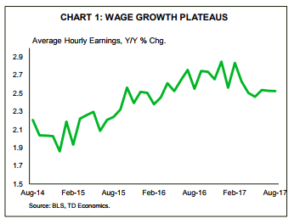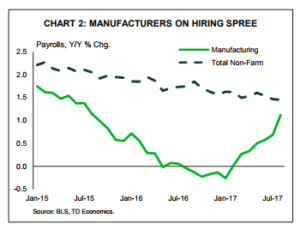FINANCIAL NEWS HIGHLIGHTS OF THE WEEK
- Substantial positive revisions to Q2 US GDP indicated stronger momentum going into the third quarter than previously thought, with Hurricane Harvey expected to shave 0.1-0.4 ppts. off growth in Q3.
- Inflation continued to be stubbornly elusive in July but we still expect a hike by the Fed in December, given that inflation will likely strengthen in the coming months.
- Global economies continue to strengthen alongside the US, with China’s Caixin manufacturing PMI expanding to its highest level in six months in August, led by strong foreign demand for goods.
Inflation Remains Elusive in Q3
It was a busy week for data this week in the US, with investors looking for clues on how the economy is performing and whether it warrants further tightening. Substantial positive revisions to Q2 US GDP indicated stronger momentum going into the third quarter than previously thought, with Q2 growth revised up to a robust 3.0% annualized. However, Hurricane Harvey, which made landfall in Southeast Texas last week, looks to be a transitory obstruction for the economy in Q3. The storm is expected to shave 0.1-0.4 ppts. off growth but a similar acceleration in Q4 should leave the second half of the year unchanged on balance. Harvey will also necessitate the passage of a disaster assistance package by the federal government. On that note, until further details surrounding policy and tax reform materialize, investors will remain fixated on economic data.
Evidence to support the Fed’s tightening path was mixed as the week progressed. July’s personal income & spending report highlighted the pivotal role of the consumer in the economic recovery, with strength in real spending apparent. But the missing piece of the puzzle continues to be inflation, which has been stubbornly elusive during this recovery. And this was compounded by Friday’s jobs report that indicated relatively subdued wage growth –a trend that does not bode well for the inflation outlook (Chart 1). We still expect a hike by the Fed in December, but expect that inflation will materialize in the coming months. Manufacturing activity displayed pronounced strength in hiring in August while the positive ISM reading for the month prefaces continued strength in the sector going forward (Chart 2). As such, investor confidence in the American economy remains intact, whichalongside weaker inflation has supported US equities.
Asian economies have also shown increased momentum lately. Case in point, China’s Caixin manufacturing PMI expanded to its highest level in six months in August, led by strong demand for exports. That’s a welcome development given concerns regarding the economy’s slowing growth this year and the role that government debt has had in stimulating growth. Other Asian economies echoed this constructive tone, leading the MSCI Asia Pacific Index to a level just shy of a decade high.
 European equities also reaped the benefits of improving economic data. Despite August’s strong inflation reading in the Eurozone, the ECB is expected to leave its policy stance unchanged at next week’s meeting. The committee’s monetary policy path is complicated by the differing rates of recovery within the Eurozone. Germany and Northern Europe have displayed strong growth, while Southern economies including Greece and Italy are still grappling with slow employment growth and an elevated euro that is proving to be a barrier to export growth.
European equities also reaped the benefits of improving economic data. Despite August’s strong inflation reading in the Eurozone, the ECB is expected to leave its policy stance unchanged at next week’s meeting. The committee’s monetary policy path is complicated by the differing rates of recovery within the Eurozone. Germany and Northern Europe have displayed strong growth, while Southern economies including Greece and Italy are still grappling with slow employment growth and an elevated euro that is proving to be a barrier to export growth.
With a relatively quiet data release schedule for next week, investors will turn their attention to the array of speeches being made by FOMC members. Of central importance will be their views on the soft inflation and wage prints in recent data. Ultimately, we do not expect these developments to dissuade the Fed from beginning balance sheet normalization in the coming weeks, but some improvement on the inflation front is likely to be needed before another rate hike by the Fed.
Katherine Judge, Economic Analyst
This report is provided by TD Economics. It is for informational and educational purposes only as of the date of writing, and may not be appropriate for other purposes. The views and opinions expressed may change at any time based on market or other conditions and may not come to pass. This material is not intended to be relied upon as investment advice or recommendations, does not constitute a solicitation to buy or sell securities and should not be considered specific legal, investment or tax advice. The report does not provide material information about the business and affairs of TD Bank Group and the members of TD Economics are not spokespersons for TD Bank Group with respect to its business and affairs. The information contained in this report has been drawn from sources believed to be reliable, but is not guaranteed to be accurate or complete. This report contains economic analysis and views, including about future economic and financial markets performance. These are based on certain assumptions and other factors, and are subject to inherent risks and uncertainties. The actual outcome may be materially different. The Toronto-Dominion Bank and its affiliates and related entities that comprise the TD Bank Group are not liable for any errors or omissions in the information, analysis or views contained in this report, or for any loss or damage suffered.



